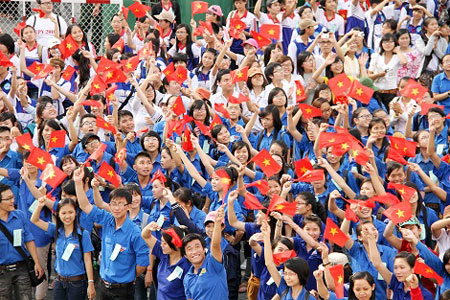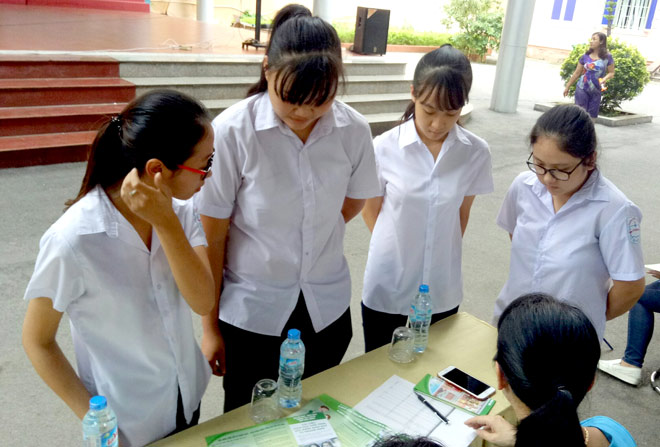What are the ages considered youth in Vietnam? Youth policies of the state in Vietnam
What are the ages considered youth in Vietnam? What are the Youth policies of the state in Vietnam? – Diem Quynh (Binh Phuoc)

What are the ages considered youth in Vietnam? Youth policies of the state in Vietnam (Internet image)
Regarding this issue, LawNet would like to answer as follows:
1. What are the ages considered youth in Vietnam?
According to Article 1 of the Youth Law 2020, the youth are Vietnamese citizens aged between full sixteen and thirty years old.
2. Youth policies of the state in Vietnam
Youth policies of the state are specified in Chapter III of the Youth Law 2020 including:
(1) Learning and scientific research policies
- Ensure equality in access to education and enable the youth to participate in scientific research.
- Promulgate and ensure implementation of programs educating on national moral values, ideals and traditions, civilized lifestyle, life skills and regulatory compliance for the youth.
- Provide policies on credit, scholarships and tuition exemption and reduction for the youth according to regulations of laws.
- Enable the youth to learn, enhance their professional qualifications; creativity and ability to research and apply scientific and technological advances.
- Provide incentives and assistance for organizations and individuals to invest in scientific research and innovation activities by the youth; participate in equipping the youth with life skills and other necessary skills.
(2) Labor and employment policies
- Give career advice and guidance, and provide information on the labor market for the youth; equip the youth with professional skills and professional ethics; protect the youth from labor coercion and exploitation.
- Enable the youth to have a job; create on-site jobs for the youth in rural areas, mountainous areas and islands as appropriate to the situation of each region and each development stage of the country.
- Enable the youth to take out concessional loans from the national employment fund and other legal credit sources to create their own jobs and advance their business operation.
(3) Entrepreneurship policies
- Equip the youth with entrepreneurship knowledge and skills.
- Provide information on markets; assist with legal affairs, science and technology, investment promotion and workforce development; and grant concessional loans from credit institutions as per the law.
- Facilitate entrepreneurship, innovation and application of science and technology by the youth.
- Offer incentives and support for service providers to assist youth entrepreneurship; encourage establishment of a youth entrepreneurship fund according to regulations of laws.
(4) Health protection, care and enhancement policies
- Give advice on and support youth health enhancement; prevention of domestic violence, school violence and sexual assault; drug and HIV/AIDS prevention; and prevention of sexually transmitted diseases, other social diseases and other risks to physical and mental health of the youth.
- Ensure the youth have information and access to friendly reproductive and sexual health services; and receive pre-marital health check-up and advice.
- Encourage organizations and individuals to invest in and provide healthcare services for the youth.
(5) Cultural and sports policies
- Enable the youth to take part and be innovative in cultural and sports activities.
- Enable the youth to actively protect and enhance national cultural values and embrace the cultural essence of humanity.
- Raise awareness and protect the youth in cyberspace.
- Encourage organizations and individuals to establish cultural and sports institutions for the youth.
(6) Fatherland protection policies
- Ensure the youth are educated on national defense and security, patriotism, revolutionary heroism and sense of Fatherland building and protection.
- Enable the youth to complete conscription; and compulsory service in the People's Public Security Force, militia and self-defense forces; join reserve forces and contribute to the all-people national defense and people’s national security as per the law.
- The youth completing conscription and compulsory service in the People's Public Security Force are entitled to vocational training assistance and other incentive policies according to regulations of laws.
(7) Policies for youth pioneers
- Youth pioneers are the youth’s pioneering force in tasks of socio-economic development, employment, education and training for the youth and other ad hoc, urgent and arduous tasks in the building and protection of the Fatherland.
- The State shall promulgate policies for youth pioneers to perform the following tasks:
+ Participate in socio-economic development projects assigned by the State;
+ Participate in disaster and epidemic recovery; environmental protection; assurance of public order, social safety, and national defense and security;
+ Take part in goods manufacturing, service provision, transfer of technological advances in manufacturing and vocational training in connection with job creation for the youth;
+ Ad hoc, urgent and arduous tasks per the law.
- The State shall ensure funding, facilities and equipment necessary for youth pioneer organizations to complete tasks assigned by the State.
- Youth pioneers are entitled to benefits during and after performing assigned tasks.
(8) Policies for youth volunteers
- Youth volunteers are the youth voluntarily taking part in activities for the community and society that comply with regulations of laws.
- Policies for youth volunteers promulgated by the State shall focus on:
+ Establishing information channels for the youth to access and join volunteer activities;
+ Developing programs and projects enabling youth volunteers to work in areas with extreme socio-economic difficulties, in border areas and on islands;
+ Encouraging organizations and individuals to enable the youth to take part in volunteer activities for the community and society.
(9) Policies for talent youth
- The State shall implement policies on detection, training, attraction, employment and benefits for talent youth.
- Heads of regulatory bodies and organizations shall implement talent youth policies ex officio.
(10) Policies for ethnic minority youth
- Give priority in terms of education, labor, employment, entrepreneurship, healthcare and sports to ethnic minority youth.
- Enable ethnic minority youth to protect and enhance their cultural identities, lead a civilized lifestyle and fight against obsolete customs.
- Prioritize officials and public employees being ethnic minority youth of state bodies, organizations and units when selecting officials and public employees for training and adding to leadership and management planning.
- Encourage enterprises and organizations to prioritize employment of ethnic minority youth.
(11) Policies for youths aged between full sixteen and eighteen years old
- Ensure these youths complete universalization of education as per the law.
- Prioritize and enable these youths to participate in cultural, sports and recreation activities suitable for their capacity and age for comprehensive development.
- Provide training and career advice appropriate to their age.
- Equip these youths with knowledge and skills necessary to protect themselves against risks to physical and mental health; ensure assistance and intervention measures for youths aged between full sixteen and eighteen years old to enjoy a safe and healthy life.
- Ensure criminal, administrative and civil policies are implemented as prescribed by law.
- Prioritize quick resolution of cases causing harm to physical and mental health of youths aged between full sixteen and eighteen years old.
- Encourage organizations and individuals to detect and nurture talented youths aged between full sixteen and eighteen years old.
- The Government shall stipulate mechanisms, policies and measures for implementation of policies for youths aged between full sixteen and eighteen years old.
- Key word:
- youth policies of the state
- youth
- in Vietnam
- Cases of land rent exemption and reduction under the latest regulations in Vietnam
- Economic infrastructure and social infrastructure system in Thu Duc City, Ho Chi Minh City
- Regulations on ordination with foreign elements in religious organizations in Vietnam
- Increase land compensation prices in Vietnam from January 1, 2026
- Determination of land compensation levels for damage during land requisition process in Vietnam
- Who is permitted to purchase social housing according to latest regulations in Vietnam?
-

- 06 life skills necessary for health development ...
- 11:07, 05/11/2024
-

- Emergency response and search and rescue organizations ...
- 10:29, 11/09/2024
-

- Handling of the acceptance results of ministerial ...
- 09:30, 11/09/2024
-

- Guidance on unexploded ordnance investigation ...
- 18:30, 09/09/2024
-

- Sources of the National database on construction ...
- 16:37, 09/09/2024
-

- Notable new policies of Vietnam effective as of ...
- 16:26, 11/04/2025
-
.Medium.png)
- Notable documents of Vietnam in the previous week ...
- 16:21, 11/04/2025
-
.Medium.png)
- Notable documents of Vietnam in the previous week ...
- 16:11, 02/04/2025
-
.Medium.png)
- Notable new policies of Vietnam to be effective ...
- 16:04, 02/04/2025
-
.Medium.png)
- Notable new policies of Vietnam effective from ...
- 14:51, 21/03/2025

 Article table of contents
Article table of contents
